► Sainz wins for Audi at third attempt
► It’s the former WRC champ’s fourth win
► De Mevius and Loeb on the podium
Carlos Sainz and co-driver Lucas Cruz have taken victory in the 2024 Dakar Rally, driving an Audi RS Q e-tron E2. It’s the two-time WRC champion’s fourth win in the event – in four makes of car – and Audi’s first, taken at the third and final attempt on the Saudi Arabian event.
Sainz assumed the lead on Stage 6 and held it throughout the second week of the rally. As the challenge of teammates Mattias Ekström and Stéphane Peterhansel faded, the Spaniard just had to manage the gap to second. Indeed, Sainz had adopted a very measured pace throughout, posting second-fastest times on three stages but never actually winning any. In many ways, it was a tactical masterclass that ensured victory by a margin of an hour and 20 minutes.
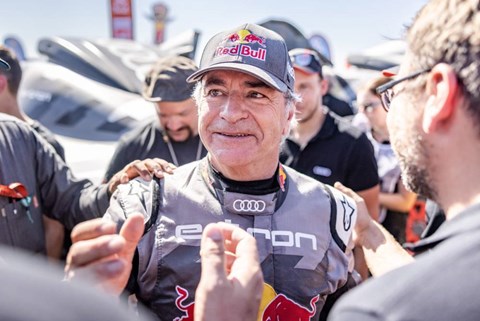 Carlos Sainz congratulated on winning Dakar Rally 2024.
Carlos Sainz congratulated on winning Dakar Rally 2024.
Car category debutante Guillaume de Mevius took second place in his Overdrive Toyota Hilux. As podium contenders Ekström and works Toyota Gazoo Racing man Lucas Moraes fell by the wayside, the Belgian’s consistency saw him rise up the rankings. Finishing second on Stage 11 vaulted him into second overall as Sébastien Loeb hit trouble.
Loeb was the biggest threat to Sainz during the second week and looked like he could steal the lead. Five stage wins showed Loeb’s speed and that of his Bahrain Xraid Prodrive Hunter, but the car’s continued fragility hampered his efforts. Broken suspension caused a delay of over 90 minutes on Stage 11, dropping him out of contention.
Winning the Stage 12 secured the last step on the podium for Loeb by just six minutes over Guerlain Chicherit, winner on Stage 10 and 11. The nine-time WRC champion now has five Dakar podiums on his record, but a maiden win remains elusive.
Pre-event favourite Nasser Al-Attiyah retired on Stage 9 after a litany of mechanical issues in his Hunter. The Qatari quipped that he never wanted to drive the thing ever again.
Mathieu Serradori led the two-wheel-drive runners his Century CR6-T while Akira Miura won the production-spec T2 class for the fourth time in a Toyota Land Cruiser.
Now we’ll take a look at the other categories.
T3 Challenger and T4 SSV
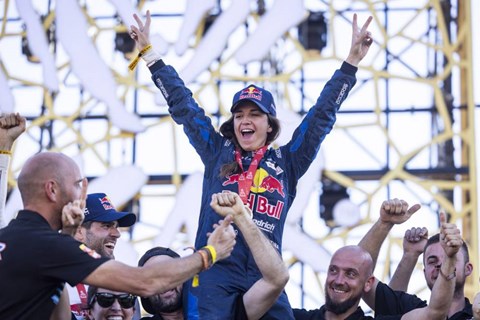 Cristina Gutierrez took a last-gasp T3 Challenger win.
Cristina Gutierrez took a last-gasp T3 Challenger win.
A dramatic finish in the T3 buggy category saw Red Bull Off-Road driver Cristina Gutierrez become only the second woman to win on the Dakar Rally since Jutta Kleinschmidt won the car category in 2001. Gutierrez held second place throughout the second week, closely enough that she was able to grab the lead and the win in her Taurus T3 Max when long-time leader Mitch Guthrie suffered issues on the final stage.
Works Taurus driver Guthrie inherited the lead when Eryk Goczal was controversially disqualified. The Polish teenager had dominated the first week of the rally but he – and his uncle, Michal – was booted out when it was discovered his car had a carbon clutch. Guthrie cruised through the second week, managing the gap to Gutierrez, but he undone by transmission problems. Rokas Baciuska rounded out the podium.
Former biker Xavier de Soultrait won the class for production-spec T4 buggies in his Polaris by just two minutes, 25 seconds from Jerome de Sadeleer. Local man Yasir Seaidan secured third. Stunt driver Sara Price has been in contention for a podium at her first attempt for much of the second week, but issues on Stage 11 dropped her to fourth.
Trucks
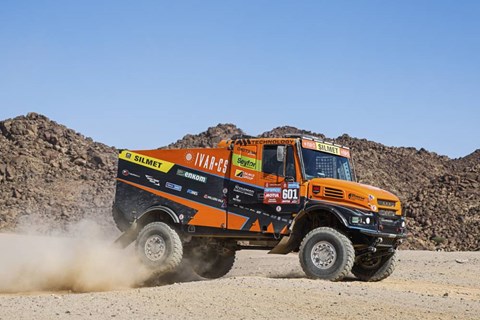 Martin Macik never looked like loosing his lead.
Martin Macik never looked like loosing his lead.
Martin Macik took an easy win in the Iveco Powerstar run by his MM Technology outfit. He swept into the lead at the end of week one after erstwhile leader Janus van Kasteren hit technical troubles, and never looked under threat. It’s the first win for a Czech driver since Karel Loprais won in 2001.
Ales Loprais finished second in his Praga, nearly two hours adrift, having chalked up two stage wins. 21-year-old Mitchel van den Brink claimed his first podium driving the Eurol Rallysport Iveco, four and a half hours in arrears. Gert Huzink put in an eye-catching performance in week two, winning Stage 9 and 10 in his hybrid-powered Renault. But he was already too far behind to be a factor.
Bikes and Quads
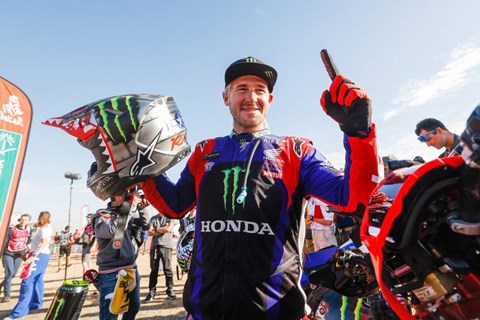 Ricky Brabec took a beautifully controlled win in the bikes.
Ricky Brabec took a beautifully controlled win in the bikes.
Works Honda rider Ricky Brabec took his second Dakar win, having led since Stage 6. He claimed just one stage win, on Stage 10, but made sure he did enough to hold second-placed man Ross Branch at bay.
The hugely popular Botswanan had led for much of the first week aboard his Hero and was always within touching distance of Brabec. But a win was really only on the cards if his American rival hit trouble. Adrien van Beveren was third on his factory Honda machine.
Harith Noah won the Rally 2 class on his Sherco, becoming the first Indian competitor to win a Dakar category. Pizza delivery driver Tobias Ebster won the Original by Motul class for riders without a back-up crew on his Dakar debut.
Manuel Andujar prevailed over Alexandre Giroud in an unusually close battle on the quads. The pair had traded the lead throughout the event and finished just eight minutes apart.
Dakar Future and Dakar Classic
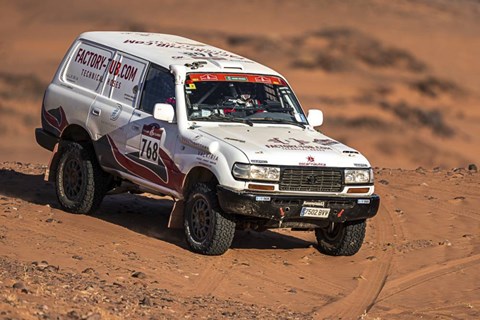 Carlos Santaolalla looked like a shoe-in for the Classic win for most of the event.
Carlos Santaolalla looked like a shoe-in for the Classic win for most of the event.
Veteran Dakar competitor Jordi Juvanteny won the Dakar Future Mission 1000 category for alternatively powered vehicles, driving an enormous six-wheel-drive MAN truck with a hydrogen combustion engine. Airbus engineer Jean Michel Paulhe was second in a hybrid Can-Am buggy and Wenmin Su was third on an electric Arctic Leopard bike.
The Mission 1000 competitors completed a course of 100km every day, accruing points for their performance on each stage. The Dakar Classic is a regularity rally that runs alongside the main event, the crews attempting to achieve a set average speed. Cars and trucks of a type that could – or indeed, did – take part in the Dakar before 2000 can take part.
Carlos Santaolalla won the Classic in his J80-gen Toyota Land Cruiser, having headed the leaderboard for nine of the 12 stages. Lorenzo Traglio took second in his Nissan Pathfinder, followed by Paolo Bedeschi driving a J70 Land Cruiser. Fan favourite Ondrej Klymciw looked set for a podium – or even the win – in his rear-engined Skoda 130 before hitting trouble on Stage 8.
The Brits
Four-time ladies World Enduro champion Jane Daniels clamed 48th place in the bike category, riding for the factory Fantic team, with David McBride just a few minutes behind in 49th. Andrew Graham and Gavin Neate were 29th in the Dakar Classic with a Land Rover Defender.
Images courtesy of Dakar Rally